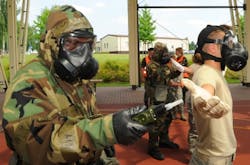Defending military communications systems from electronic warfare attack is aim of CommEX research contracts
ROME, N.Y., 3 April 2011. Scientists at the U.S. Air Force Research Laboratory in Rome, N.Y., are awarding contracts to two companies to find ways for military communications systems to operate reliably in the presence of advanced electronic warfare, jamming, and interference as part of the Communications Under Extreme RF Spectrum Conditions (CommEX) program.The Air Force Research Lab, on behalf o the U.S. Defense Advanced Research Projects Agency (DARPA) Strategic Technology Office in Arlington, Va., awarded CommEX contracts last week to Shared Spectrum Co. in Vienna, Va., and to the BAE Systems Electronics Solutions segment in Merrimack, N.H. Shared Spectrum won a $5.9 million contract and BAE Systems won a $6 million contract.Secure communications experts from the two companies will develop technologies for adaptive interference suppression for typical military missions and equipment in the presence of high-power jamming that blinds RF receivers with intermodulation distortion; traditional types of jamming; adaptive jamming; and distributed interference from several different sources.
Both companies have been involved in military communications and electronic warfare programs before. Shared Spectrum has worked with the Air Force Research Lab to develop ways to allocate RF spectrum efficiently for existing radios in the field. BAE Systems most recently won an $8.4 million contract to develop electronic warfare machine learning to jam enemy adaptive communications automatically as part of the DARPA Behavioral Learning for Adaptive Electronic Warfare (BLADE) program.
The overall intent of the CommEX research initiative is to defend U.S. and allied command, control, communications, computer, intelligence, surveillance, reconnaissance, and related applications that use the electromagnetic spectrum from sophisticated electronic warfare attacks, or from inadvertent RF interference in congested signal areas.
In developing technologies and techniques for adaptive interference suppression, Shared Spectrum and BAE Systems researchers will consider frequency and time agility; smart antenna techniques; advanced circuits and novel receiver architectures; linear, adaptive, and non-linear signal processing techniques; adaptive modulation and error control waveform properties; and adaptive networking.
Company researchers will consider new techniques that capitalize on beam steering or null pointing for their RF interference suppression techniques. The Air Force and DARPA also are interested in adaptive communications techniques to suppress interference from adaptive jammers such that systems could recognize jamming signals rapidly and respond appropriately through communications networks to maintain connectivity and performance.
One possible way of suppressing RF interference is using smart antennas able to steer nulls in the direction of interference and to manage polarization to minimize interference. Other approaches may involve routing the communications network around sources of strong interference, or using deceptive communications signals that cause the jammer to transmit at maximum power levels, waveforms that characterize the jammer, and waveforms that the jammer actually helps.
This initial two-year phase of the CommEX program focuses on technology development. The next phase will focus on full-scale development and operational demonstration of RF interference suppression systems.
For more information contact Shared Spectrum online at www.sharedspectrum.com, BAE Systems Electronic Solutions at www.baesystems.com, the Air Force Research Lab at www.wpafb.af.mil/afrl/ri, or the DARPA Strategic Technology Office at www.darpa.mil.

